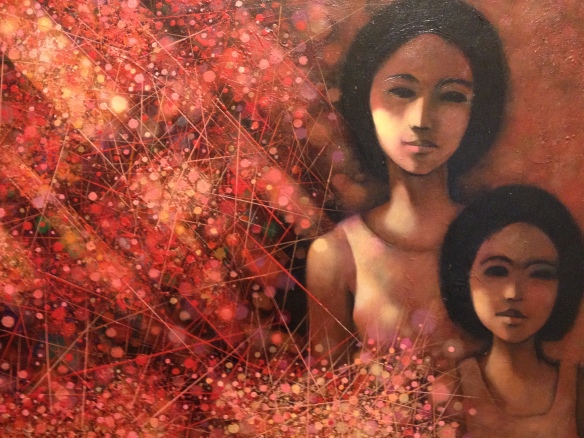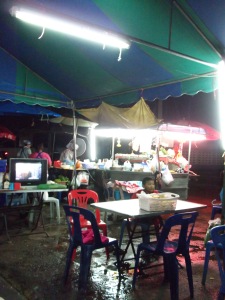Well, long time no post. Guess it’s been about 8 months since the last one. Anyways, in the midst of our current political struggles I’ve had a lot of things on my mind. I am not an expert on Thai anything at this point, I’m still a student of most things Thai, but that being said, I feel there are some important intersections between my experience as a history teacher here and the recent political situation.
I’ve now been teaching history for two years at a well-known, and to some well-respected, university in Bangkok. The university will remain nameless at this point for a number of reasons. That being said, I was quite excited to take this position early on. History is what I had spent many years doing in the U.S. and what I wanted to do here in Thailand. I had done a year teaching English just to get settled while I tried to figure out how and where I might teach history here (in English), and no offense to professional English teachers here, but I really had no interest in spinning my wheels in that environment. Criticisms of the poorly educated, sexpat farang that make up much of the English teachers here are readily available elsewhere, so I will not spend time on that here.
The position I began in was as a history lecturer for a general education World Civilization course. Granted, this is not a university that offers any social science degrees, but I assumed that history would still be something that was taught seriously. I would be teaching as part of a team to design syllabi, readings, exams, etc. This seemed ok at the time. In U.S. universities we wouldn’t really consider it team teaching, but we would have historians with the same regional expertise working together to a certain degree (Latin Americanists, Africanists, Europeanists, etc.).
But as I quickly learned, this was a quite different situation. The core team members, Thai ajarn that had been teaching this course for many years, had next to no background in the social sciences. Most were glorified administrative staff whose English was good enough that someone thought they could be promoted to be teachers. The “team” was really not a team, but a bunch of ajarn subservient to the course coordinator who directed the course. Because this is a required course that many students have to take, foreign teachers from the English department are often brought in to teach a few sections, but once again, normally with no background in, or understanding of, history as a discipline. The readings that had been compiled for this course were outdated, Eurocentric, often racist, and sometimes just completely at odds with modern historical understandings. There was no understanding of history as a tool to teach critical thinking amongst students, or as a means to make better sense of their present. “Some Interesting, but not really Important, Shit that Happened in the Past” would have been a better title of the course.
As the problems became more and more apparent, I tried to voice some suggestions about how me might make this class more stimulating, modern, and historically sound. But I quickly discovered that the “team” had no interest in making any changes. What they expected was to repeat the same lesson, with the same materials, every semester. The idea of updating, fact checking, or having any debate about the content of the course was foreign and unwanted. This way the ajarn could stick to their same sleep-inducing power points every semester, and could, in fact, avoid even reading the course materials themselves as their lessons came directly from third party tutorials that inundate this university, and many others in Thailand.
After a year and a half of this situation, I wrote a detailed report of the problems and submitted it to my departmental administration and the other team members. This was during the most recent backlash over the Hitler mural at Chulalongkorn University, the Nazi themed Sports Days that occur every year in Thailand, and the swastika t-shirts and apparel that can be seen quite often around Thailand. I connected this to the fact that my team members taught World War II with a reading that didn’t even discuss the anti-Semitism and racism of Nazi ideology, nor concentration camps. Well, of course the other ajarn were upset that I  had called out their ignorance (not a very Thai thing to do, I know), and my superiors were fed up and obtuse about my complaining. Their solution was to offer me my own course, that I would design and teach by myself, and to leave World Civ as the poorly taught course that it was. The only reason not to fire me was that I have a quality degree background and it looks good to the university to have me on the faculty. This, and the fact that my bosses seem to realize that I know what I am talking about, even if they don’t understand what that is. My initial reaction was to quit and look for a job somewhere else, as working in an actual social science department in Thailand is my eventual goal. But after talking with some of my Thai coworkers that are actually real teachers, I was convinced to try out the new course, at least for a year. Because I have seen the potential in many of the students at this university, and have developed some good relationships with past students, I decided to stay . . . for a minute.
had called out their ignorance (not a very Thai thing to do, I know), and my superiors were fed up and obtuse about my complaining. Their solution was to offer me my own course, that I would design and teach by myself, and to leave World Civ as the poorly taught course that it was. The only reason not to fire me was that I have a quality degree background and it looks good to the university to have me on the faculty. This, and the fact that my bosses seem to realize that I know what I am talking about, even if they don’t understand what that is. My initial reaction was to quit and look for a job somewhere else, as working in an actual social science department in Thailand is my eventual goal. But after talking with some of my Thai coworkers that are actually real teachers, I was convinced to try out the new course, at least for a year. Because I have seen the potential in many of the students at this university, and have developed some good relationships with past students, I decided to stay . . . for a minute.
I’ll probably write about my experience teaching this new course in the future, but for now I can say that while frustrating, it’s going ok. Frustrating in the sense that your average Thai student has little knowledge of important historical events, or any thought to problematize things like race, gender, culture, nationalism, etc., and has been given little impetus by the Thai educational system to question or think critically about anything around them. Frustrating as a black person that these students love black Hollywood actors or hip hop music, but have little understanding of the struggles that black people have faced to get to this point. As I am teaching in Thailand, even more frustrating is the fact that these students have little understanding of the struggles of Asian/Thai Americans, colonialism in Asia, or the disastrous and interconnected histories of their brothers and sisters next door in Laos, Cambodia and Vietnam. But, these faults are of the system, and not Thai students, and when taught in the correct way, I find that Thai students are very inquisitive, empathetic and open to new understandings of the world.
So, what does all of this have to do with our recent political problems? Well, I will try not to expose my own political leanings, suffice to say I am not a red or yellow shirt supporter. I want the fairest, freest, and most democratic Thailand possible. Unlike most foreign residents in Thailand whose comments on the situation are basically “I hope Thais can work all this out for themselves,” I am probably going to live the rest of my life and raise a family in Thailand, so these problems are my own. What other farang that choose to live here offer to Thailand’s future I don’t know, but my own inadequate price of admission is to help Thai youth understand their own and others histories, and as such become a better informed electorate.
And here we come back to the title of this post, “the Contagion of Liberty.” I heard this in a documentary I was showing my students on the Haitian Revolution. It was in reference to the fear that white slave societies in Europe and the Americas had of the slave revolution that occurred in Haiti. The fear that ideas of freedom, liberty, consciousness would spread and infect other enslaved peoples, or people of color that were outside of current Enlightenment ideals of justice and equality. For me, this seems to be the state of education in Thailand. The reason why history is taught in such a conservative and nationalistic fashion. To keep dissenting views, critical thinking, and free minds at bay.  When people are not accustomed to thinking for themselves, or questioning those who are “superior” because of wealth or social status, they become easy sheep to be led one way or another, red or yellow, corrupt or corrupt (not a typo). How many Thai historians and social scientists have had to leave this country they love because their views went against the norm? Many. Who does that leave to teach our Thai youth? A few good ajarn against an army of ignorance. The good fight, I suppose, but difficult. But as for the impacts of all this on Thailand, my own view is that historical, cultural, social and political ignorance has been fostered by successive governments, amongst its own people, in order to keep them subservient to meaningless and mundane things, as well as forgetful of those that have fought against this in their own past, so that today there is little recognition or understanding of what a word/concept like “democracy,” in all its manifestations, really means.
When people are not accustomed to thinking for themselves, or questioning those who are “superior” because of wealth or social status, they become easy sheep to be led one way or another, red or yellow, corrupt or corrupt (not a typo). How many Thai historians and social scientists have had to leave this country they love because their views went against the norm? Many. Who does that leave to teach our Thai youth? A few good ajarn against an army of ignorance. The good fight, I suppose, but difficult. But as for the impacts of all this on Thailand, my own view is that historical, cultural, social and political ignorance has been fostered by successive governments, amongst its own people, in order to keep them subservient to meaningless and mundane things, as well as forgetful of those that have fought against this in their own past, so that today there is little recognition or understanding of what a word/concept like “democracy,” in all its manifestations, really means.

















